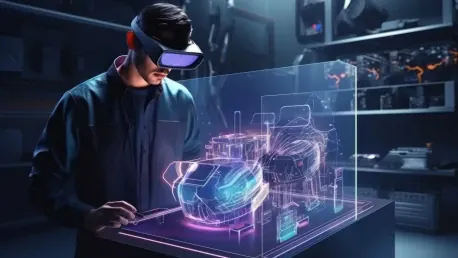The ever-evolving landscape of extended reality (XR) is on the brink of a significant transformation with Meta’s recent v74 SDK update, which officially transitions to OpenXR as the recommended development pathway. This landmark move is strategically poised to revolutionize cross-platform development in the XR industry by enabling developers to create immersive experiences that can seamlessly deploy across numerous platforms without compatibility concerns. Since Meta’s initial foray into OpenXR collaboration in 2016, the company has laid the groundwork for this crucial shift, aiming to streamline the development process and broaden the reach of XR applications across the board. As the XR market becomes increasingly competitive, developers are under mounting pressure to find efficient ways to reach a wider audience, and Meta’s commitment to OpenXR is poised to be the game-changer they need.
With the OpenXR Meta package now matching the Oculus XR plugin in functionality, developers can build applications once and deploy them universally while still integrating Horizon OS features. This unified approach comes at a pivotal moment when the XR field is ripe for innovation and expansion. Industry analyst Sarah Chen emphasizes that Meta’s embrace of OpenXR heralds a future where collaborative efforts outshine isolated endeavors. As the XR sector continues to grow, Meta’s support for OpenXR could unify the industry’s fragmented landscape, fostering unprecedented levels of collaboration and innovation.
Tailored Support for Major Game Engines
To facilitate the transition to OpenXR, Meta has ensured that each game engine receives a tailored approach to meet developers’ specific needs. For Unity developers, the shift to OpenXR is designed to be seamless, maintaining full access to Horizon OS features and ensuring minimal disruption to existing workflows. The integration for Unity highlights Meta’s dedication to a smooth transition process, backed by robust support and tools that simplify adaptation.
For Unreal developers, Meta offers a choice between pure OpenXR and a custom Meta fork available on GitHub, which provides additional platform-specific features. This approach accommodates developers who seek extensive customization and the flexibility to tailor their applications to particular requirements. The open-source nature of the Unreal OpenXR integration underscores Meta’s commitment to transparency and community-driven development, enabling developers to contribute to and refine the platform collaboratively.
Similarly, Godot’s direct integration with OpenXR supports core XR features out of the box, providing developers with a versatile foundation for their projects. Additional capabilities are accessible through the Godot OpenXR Vendors plugin, which extends the platform’s functionality and opens new possibilities for creative exploration. By ensuring each game engine has a well-defined path to OpenXR compatibility, Meta is setting the stage for widespread adoption and the proliferation of multi-platform XR applications.
Broad Implications for Industries Beyond Gaming
The implications of Meta’s v74 SDK update are far-reaching, extending beyond the confines of gaming and entertainment into various industries such as manufacturing, healthcare, education, and more. By reducing development costs and simplifying the deployment process, the shift to OpenXR allows these sectors to create and utilize XR training simulations that are compatible across different hardware, thereby broadening access and usability. For example, architects and designers can develop VR walkthroughs that are readily accessible to clients regardless of their chosen headsets, enhancing client engagement and decision-making processes.
In the retail sector, businesses stand to benefit significantly from the creation of virtual showrooms that cater to the entire XR ecosystem. This inclusive approach enables retailers to reach a broader audience economically, offering consumers a more immersive and personalized shopping experience. As OpenXR dissolves hardware compatibility issues, it bridges the gap between different XR platforms and fosters a more cohesive market landscape.
For consumers, the widespread adoption of OpenXR promises to alleviate the frustration associated with app exclusivity tied to specific hardware. With more developers embracing OpenXR, users can select headsets based on personal preference rather than being constrained by limited app availability. Meta’s contributions to initiatives like Khronos and cross-vendor extensions—including advancements such as SpaceWarp, foveation, and passthrough—demonstrate their commitment to driving industry-wide progress and enhancing the user experience.
Unleashing Creativity and Expanding the XR Market
The rapidly changing landscape of extended reality (XR) is on the verge of a significant transformation with Meta’s recent v74 SDK update, which now officially recommends OpenXR as the primary development pathway. This substantial shift is aimed at revolutionizing cross-platform development within the XR industry, allowing developers to create immersive experiences that can be deployed seamlessly across various platforms without compatibility issues. Since Meta began its collaboration with OpenXR in 2016, the company has been setting the stage for this essential transition, with the goal of streamlining the development process and expanding the reach of XR applications industry-wide.
With the new OpenXR Meta package equaling the Oculus XR plugin in functionality, developers are now in a position to build applications once and deploy them universally, all while incorporating Horizon OS features. This unified approach comes at a crucial time when the XR field is ripe for innovation and growth. Industry analyst Sarah Chen notes that Meta’s strong support for OpenXR signals a future where collaborative efforts surpass individual undertakings. As the XR sector continues to expand, Meta’s endorsement of OpenXR could unify the industry’s fragmented landscape, encouraging unprecedented collaboration and innovation.









